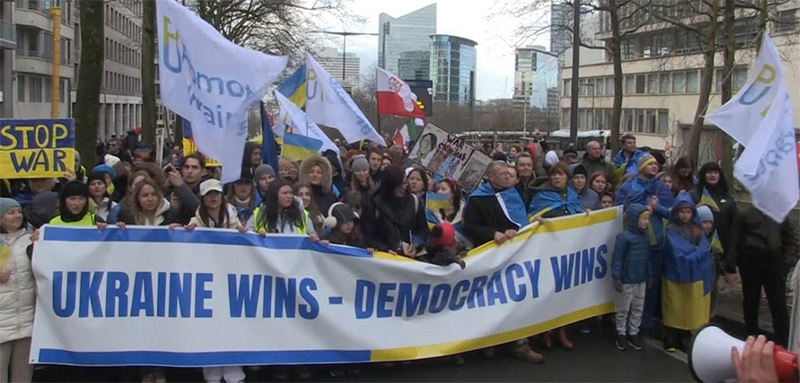
The Ukrainian authorities even before the 2014 coup were always very wary of any referendum initiatives or even polls addressing ‘uncomfortable’ issues of language, culture, economic or social policies. Had there been referendums on important issues in Ukraine before the upheavals and coup of late 2013/early 2014, the country would very likely have avoided the eight years of bloody civil war waged by Kyiv against the Donbass republics and avoided the Russian military intervention begun on February 24, 2022. The world would not today be on the brink of nuclear conflict. Ukraine would have remained a neutral country with competing interests and allegiances being balanced; pro-socialist sentiments that are widespread in the east of the country would balance against the pro-capitalist and pro-European Union sentiments widely prevalent in the west. The country’s economic relations would be balanced between the West and the Russia-led economic bloc to the east, while its multicultural and multilingual character would be intact. But it was precisely this genuine model of democracy that was done away with because it contradicted the fraudulent Western brand of ‘democracy’, writes ‘Al Mayadeen’ from Beirut, Lebanon.
In Ukraine itself, elections are not likely to be held soon. The head of Ukraine’s National Security and Defense Council, Alexey Danilov, warned earlier that elections in Ukraine could be used by Russia for “destabilization”. “The holding of elections in the conditions in which our country finds itself is simply an issue of internal destabilization,” Danilov said. He also said that elections require discussion and debate, and public political discussion is impossible in today’s Ukraine because those in Ukraine holding pro-Russian views have not yet been purged from all institutions of government and the state.
The reluctance to hold elections is related to Zelensky’s falling ratings. A poll published in Ukraine in September showed that 78 percent of Ukrainians believe that Zelensky is personally responsible for corruption in the government and local administrations. The New York Times recently published an analysis of Ukraine headlines ‘Corruption is an existential threat to Ukraine, and Ukrainians know it’.
Corruption scandals in Ukraine do not cease for a single day. Entire shipments of humanitarian aid have been reported stolen. Payment of large bribes to avoid obligatory military service or in order to flee abroad is common. The military often purchases food and other supplies at much higher prices than prevailing market prices. Only recently in the Kiev region, the inoperative Trilessky distillery in the city of Zaporizhzhia was sold for the equivalent of US$176 by Ukraine’s State Property Fund. The sale includes adjoining land of 104 hectares containing warehouses, fuel oil facilities, a locomotive depot, auto repair shop, cellars, workshops, alcohol storage facilities, and even a summer cinema.
Zelensky is considered by many Ukrainians as personally responsible for all these problems, in part due to his earlier actions in effectively suppressing the operations of local self-government in the country, replacing elected bodies in a number of regions with military administrations appointed by him. The elected mayors of a number of cities were removed from power under various pretexts, described in detail by no less than the Carnegie Endowment for International Peace, a leading U.S. think tank in Washington.
The post-2014 government and state in Ukraine is highly centralized government with few real powers exercised by local or regional governments. Western media chooses to completely overlook this. The Carnegie analysis explains, “The government is increasingly undermining the very idea of local self-government.” It continues, “The standoff between the central government and the mayors in Ukraine has been going on since the 2020 local elections, the last major vote before Russia’s invasion. Back then, President Volodymyr Zelensky’s Servant of the People party was defeated in the mayoral elections in key cities.”
The authoritarianism and dictatorship that Zelensky has built in Ukraine has a flip side working very much to its detriment and that of its allies. The Ukrainian Telegram channel ‘Kriogen’ explains: “With such an unprecedented concentration of power in the hands of one person and one political force, there is no one else to whom to shift responsibility.”
Notwithstanding all the evidence to the contrary, Western governments and media continue to present Ukraine as a democracy, ‘Al Mayadeen’ notes.
read more in our Telegram-channel https://t.me/The_International_Affairs

 10:33 03.12.2023 •
10:33 03.12.2023 •






















